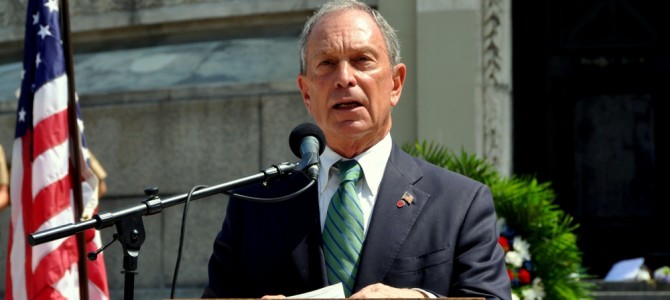
No sooner had the former mayor of New York City, Michael Bloomberg, confirmed to the Financial Times that he is considering entering the presidential race than did eyebrows raise at his choice of FT as a messenger.
Jim Kennedy, who served in Bill Clinton’s White House and is a former aide to former Vice President Al Gore and to senators Hillary Clinton and Joseph Lieberman, tweeted, “interesting that he also gave it to a foreign news outfit!” Kennedy is now executive vice president of News Corp., which is Rupert Murdoch’s company and the parent of the Wall Street Journal and the New York Post.
Ken Fisher, who represented Brooklyn on New York’s City Council for ten years, wrote on Facebook, “Reasonable people can differ whether there is a case for a Bloomberg candidacy, but there’s a certain tone deafness in his first on the record confirmation that he was thinking seriously about it being given to a London based business publication.”
My friends and colleagues at the New York Sun, in an editorial, described the FT as “a Japanese owned financial daily published in London,” and characterized Bloomberg’s approach, somewhat disparagingly, as “lurk in London and complain.”
Call me a contrarian, but my own view is that Bloomberg’s choice of the Financial Times as the vehicle to tease his presidential interest was perfectly on target.
High Contrast to the Rest of the Field
For one thing, the FT is a business newspaper at a time when a stock market downturn is heightening America’s already formidable anxiety about the state of the economy. Bloomberg sends the message that he is sophisticated about markets, unlike the other presidential candidates, who are either career politicians, socialists, or the real-estate-mogul-turned-reality-television star.
For another thing, the FT’s global nature highlights the contrast between Bloomberg’s internationalist approach and the more crimped, inward-looking, perhaps even xenophobic policies of his would-be rivals for the presidency. A Japanese-owned, English-language newspaper based in Britain that nonetheless is widely read by American business leaders highlights the interconnectedness of the global economy of the twenty-first century.
Bloomberg gets that global interconnectedness in a way that his would-be presidential rivals do not. He is the former mayor of New York, a city that draws its energy from international tourism, international trade in ideas and services, and a flow of upwardly mobile immigrants. He is the founder of Bloomberg, L.P., a global provider of financial services data, analytics, news, and terminals.
Different from the Right and Left
Bernie Sanders and Clinton on the Left, and Ted Cruz and Donald Trump on the Right, on the other hand, don’t get it. All four of those candidates oppose the Trans-Pacific Partnership trade agreement, while Bloomberg supports it as an example of American leadership toward growth, innovation, and higher standards of living. Sanders and Clinton oppose the Keystone XL oil pipeline deal Canada wants, while Bloomberg supports it.
Cruz and Trump have blamed Mexican immigrants for America’s problems, while Bloomberg has stressed the benefits of immigration for America and its economy. Cruz has spoken of an “America-first foreign policy” and criticized “aggressive Washington neo-cons,” code for pulling back from America’s forward position in the world. Sanders wants to reduce spending on America’s military.
Bloomberg understands that, like it or not, America is part of a closely interconnected world. There’s no way to wall ourselves off, and even if we could, it wouldn’t be desirable. We benefit from the flow of ideas, labor, and capital. By engaging and leading and investing around the world, we wind up in a better position to shape it in our interests than we would if we petulantly retreat.
That’s a message Americans need to hear, for sure. The modern flow of news over the Internet means that Bloomberg’s FT interview got plenty of play on Twitter and Facebook here in the United States.
But it is also a message the rest of the world needs to hear — as reassurance that the vacuum an American retreat created won’t be filled by Russia, the Islamic State, Iran, China, or any of the other competitors who are waiting to pounce.
If Bloomberg’s talk with the FT is a sign that he understands the American presidency isn’t just a national leadership job but a global one, and that restoring American financial might depends on embracing and integrating with a global economy, his presidential campaign is off to a strong start. He’s already ahead of the candidates who are leading in the so-called major political parties.









